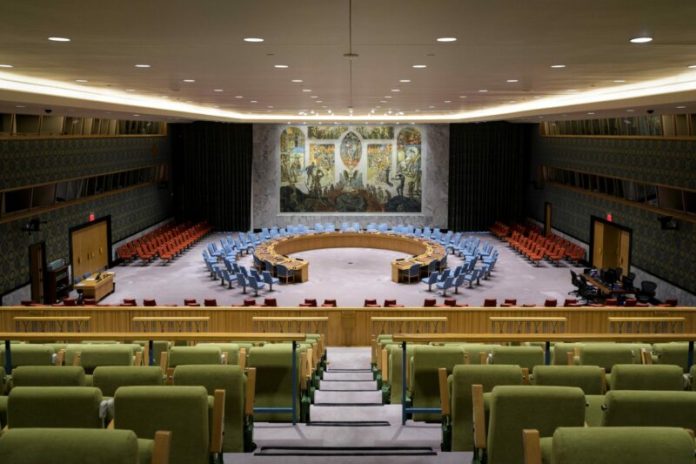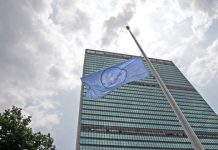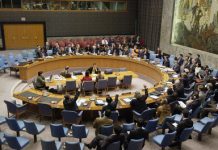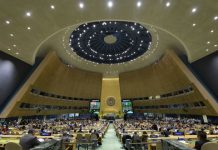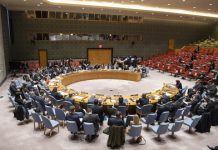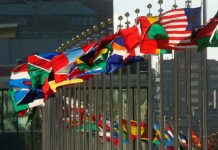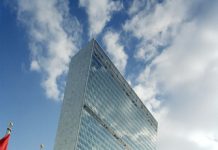Agency chief Philippe Lazzarini said that Israeli forces and personnel from the Jerusalem local authority “forcefully entered” the Kalandia Training Centre and ordered its immediate evacuation.
“At least 350 students and 30 staff were present and impacted. Tear gas and sound bombs were fired,” Mr. Lazzarini explained.
The development comes after a ban on UNRWA activities in Israel came into effect, in line with laws passed in October by the Israeli Knesset.
At least 350 students and 30 staff were present in the centre at the time.
Israeli police accompanied by municipal staff, also visited several other UNRWA schools in East Jerusalem, demanding their closure.
The incidents have disrupted learning for approximately 250 students attending three schools, alongside the trainees now locked out of the training centre.
In an interview with UN News’s Abdelmonem Makki on Wednesday Roland Friedrich, Director of UNRWA affairs in the West Bank, spoke at length about the actions and explained that the agency is committed to continuing its services, including education for 50,000 children, healthcare for half a million patients in the occupied West Bank, and emergency education programmes for 200,000 children in Gaza.
This interview has been edited for clarity and length.
UN News: Israeli forces and personnel from the Jerusalem municipality entered several UNRWA’s educational facilities in East Jerusalem on Tuesday. Could you share with us what happened exactly?
Roland Friedrich: Israeli security forces, accompanied by municipality personnel, forcefully entered our education training center in Kalandia and ordered it to be closed. That vocational training center provides training to more than 350 vulnerable Palestinian youth from all over the West Bank, and it is located in what Israel considers the sovereign territory of the state of Israel. According to international law, it’s occupied territory.
After about three hours of discussions, Israeli security forces and the municipal representatives left, and we were able to resume education, but this was the first time that an educational installation in East Jerusalem was forcefully entered by Israeli security forces.
And at the same time, in the morning, employees of the Israeli government paid visits to three schools in the occupied East Jerusalem and threatened to close them, asking for additional information, which was another breach of privileges and immunities of UNRWA.
Roland Friedrich Director of UNRWA affairs, West Bank during an interview with UN News.
UN News: What was the stated reason for these school closures by Israel?
Roland Friedrich: On the 30th of January the [Knesset legislation banning UNRWA] entered fully into effect. There are six schools, three inside the barrier, three in Shu’fat Camp refugee camp on the Palestinian side of the barrier.
There are two health centers, one in the old city of Jerusalem and the other one in Shu’fat Camp refugee camp, the rest of vocational training center in Kalandia. And finally, we have our headquarters in Sheikh Jarrah. When the bills came into effect, we continued to deliver our services to the patients and to the children. We also do the garbage collection in the Shu’fat refugee camp, and these basic services continue for the time being.
Regarding our headquarters in East Jerusalem, we are asking staff not to work from there. Over the past 12 months, we’ve seen repeated aggressions, attacks, intimidation, vandalization, and after these bills were formally adopted, we saw another uptick in incidents.
UN News: What does this mean for Israel’s international obligations?
Roland Friedrich: These laws are in contravention of Israel’s obligations as a Member State. The charter has a very clear provision on what is expected. Israel is party to the general Convention on Privileges and Immunities of the United Nations, which foresees, of course, the obligation to protect UN facilities and to ensure that privileges and immunities are respected.
This is extremely problematic both in terms of what international law has to say but also concerning our work on the ground. Another impact of those laws has been on the impediment of coordinating directly with Israeli duty bearers and particularly the Israeli military. That means at the moment, we can’t speak to them, we can’t deconflict, we can’t raise issues concerning our installations and we can’t address access issues directly anymore.
It’s even more problematic because now we have an unprecedented situation of forcible displacement in the northern West Bank, with more than 40,000 people displaced because of heavily militarized Israeli security forces operations since the 21st of January. And that has never happened in the history of the West Bank since Israel’s occupation that started in 1967.
UN News: What’s the next step for the agency in response to these measures, given the fact that the agency has a clear mandate from the UN General Assembly?
Roland Friedrich: We have a very clear mandate, and we are committed to continue delivering our services as effectively as possible, as long as possible and wherever possible, because we have an obligation here.
To give you an example, in the West Bank, we run 96 schools with more than 50,000 students. Effectively this year, the number of students registering to go to UNRWA schools in the West Bank has increased because of the socioeconomic deterioration of the situation on the ground.
We provide primary health care to half a million patients. We run 43 health centers and a hospital on the ground. We provide cash assistance and relief services to more than 200,000 vulnerable Palestinians, some of that in close coordination with other UN agencies.
We have a mandate to continue doing this, and we’re committed to doing that as long as we can.
UN News: UNRWA emphasizes the need to preserve children’s access to education and protect UN facilities. Does the agency have any alternative plans to enable those children to continue their education if this such incident happens again?
Roland Friedrich: I think we have to differentiate between East Jerusalem and the rest of the West Bank because the situation there is slightly different in issues concerning the schools that we run and the places where we run these schools.
There are very, very little alternatives, if any. And there’s certainly no alternative to the Kalandia Training Centre where we provide this vocational training to the 350 trainees who come from the West Bank. That’s the training facility that UNRWA has been running since the 1950s, and there is no alternative.
When we look at the situation in the West Bank because of the ongoing Israeli operation, it has a very direct impact on children’s ability to access education because of the displacement in the northern West Bank and because of the ongoing operations.
There are 13 schools in four refugee camps that have not operated since 21 January, which means roughly 5,000 children who do not have access to education now. We try to provide alternative means of learning, but clearly this is an unprecedented situation of displacement.
It’s not easy to reach all the children and their families. They are, of course, dislocated and traumatized, and we’re very concerned that there is no clear end to this operation that would allow us to reopen the schools and get the children where they belong. And this would be in a safe space, in our school.
UN News: Beyond the immediate impact on the children and staff involved in such incidents, what are the broader implications on the education and long-term prospects for children in the West Bank, including East Jerusalem.
Roland Friedrich: In the OPT [Occupied Palestinian Territory] generally, UNRWA has long been the second biggest provider of education, and we do that in line with UN values, in line with UNESCO’s standards. We have a very robust human rights tolerance-oriented curriculum, probably unique in the region.
In the Gaza Strip, for instance, we used to provide education for more than 300,000 kids. Now, there are 600,000 children that have been out of education for more than a year and a half, deeply traumatized, living in misery.
And everybody should have an interest to make sure that these children have access to education, quality education as quickly as possible. We’re committed to doing this to the extent possible. We have started the emergency education program in Gaza, and we’re rolling it out now, with more than 200,000 kids signed up for these emergency education programs in Gaza going forward.
When it comes to the West Bank, we have 50,000 children in our schools, mostly from poor backgrounds, living in areas of conflict, in areas where there’s a lot of poverty, particularly the refugee camps. And we are continuing to provide those services, and we’ll do that as long as possible.
Source of original article: United Nations (news.un.org). Photo credit: UN. The content of this article does not necessarily reflect the views or opinion of Global Diaspora News (www.globaldiasporanews.com).
To submit your press release: (https://www.globaldiasporanews.com/pr).
To advertise on Global Diaspora News: (www.globaldiasporanews.com/ads).
Sign up to Global Diaspora News newsletter (https://www.globaldiasporanews.com/newsletter/) to start receiving updates and opportunities directly in your email inbox for free.


